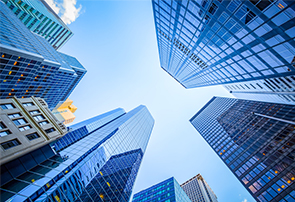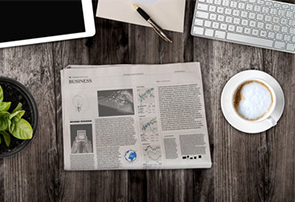Johnathan Hanh Nguyen - The First Overseas Vietnamese Entrepreneurs of the Doi Moi Era, Chosen for the "Special Mission" of the Vietnamese Government
24 - 12 - 2021
Mr. Johnathan Hanh Nguyen returned to Vietnam in 1984 after receiving an invitation from the representative of Vietnam at the UN (United Nations). The Vietnamese government prepared a private jet to take him from Tan Son Nhat airport to Hanoi, where he would meet Prime Minister Pham Van Dong. At the Government Office, the Prime Minister said: "You should try to help Vietnam open a flight route to the Philippines." During the years of siege and embargo, it was the first official international air route to capitalist countries, as well as Vietnam's first commercial operation with countries outside the socialist system.
Billionaire Johnathan Hanh Nguyen had a 90-minute conversation with Dan Tri, revealing things he had never told as the first overseas Vietnamese to return to the country to do business. He also helped Vietnam, having one of the first international trade cooperation activities after 1975 with countries outside the socialist bloc. He expressed his joy and pride at being able to contribute to Vietnam's opening-up process.
01. The Unexpected Phone Call, and the Private Jet Carried One Special Passenger
To Lan Huong: To be honest, I was taken aback by your profile: You were the first overseas Vietnamese to return home to invest and do business in Vietnam, even before the country was fully opened up and recognized the potential of a multi-sector market economy in 1985. Is there a special reason for that return?
Johnathan Hanh Nguyen: My return journey may have started in 1984, when I was working as a financial inspector for Boeing Subcontractors and received a phone call from the UN Representative Office in Vietnam. It was just a casual chatting conversation. They mainly questioned whether I wanted to go back to Vietnam to see my family and did not give me any further reason. I had been away from Vietnam for more than ten years at the time, and after graduating from my MBA, I continued to work in the US after the liberation of the South. Although I could not really guess what the reason behind the invitation was, I chose to visit my hometown.
During the Tet holiday in 1984, I brought my family to Nha Trang for the first time, followed by a visit to Hanoi at the invitation of the Government Office. Pham Van Dong, Prime Minister of Vietnam, greeted me at the Government Office. After enquiring about my family and present employment, the Prime Minister requested me to assist Vietnam in opening a flight route with the Philippines. At that time, I realized that I was on a unique and crucial mission to assist Vietnam in beginning to open its doors to the rest of the world.
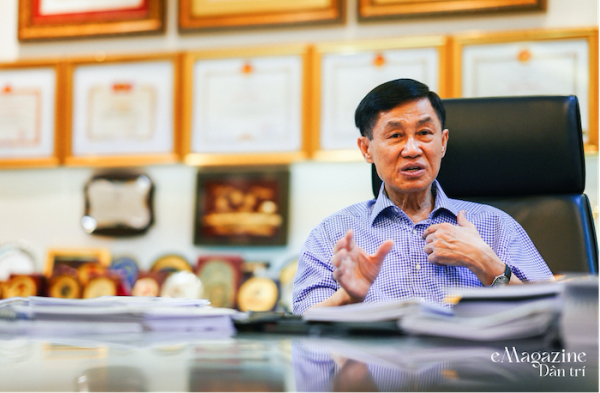
To Lan Huong: Why are you, an overseas Vietnamese, the "chosen one" for this important task?
Johnathan Hanh Nguyen: During that meeting, I also asked Prime Minister Pham Van Dong that question. I am not sure why the Vietnamese government chose me; I am merely a financial inspector for an aircraft manufacturer; thus I have no experience with route opening.
Later, I was told that the Ministry of Foreign Affairs had reviewed the list of overseas Vietnamese, and that only I worked in an aviation-related profession at the time, with a fairly high position. They were also aware that I was the nephew-in-law of President Marcos. And before that, all previous diplomatic attempts to contact President Marcos had failed.
After a long conversation, Prime Minister Pham Van Dong encouraged me to undertake this task, promising to create all conditions since this is what Vietnam is required to do in order to progressively remove the siege and economic embargo. I recall a T134 jet picking me up in Hanoi, and I was the only passenger on that plane when I returned to Ho Chi Minh City. All of this thorough information has made me realize how important this is to the Vietnamese government and the country's economy.
And I accepted!
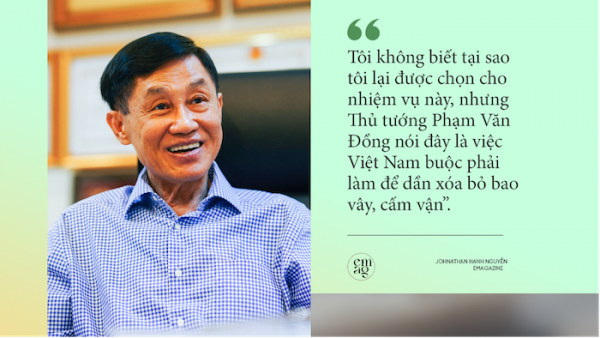
02. Strange "Luck" In The Philippine Presidential Palace And Tears Of The "Pioneers"
To Lan Huong: If all past diplomatic efforts have failed, how can you successfully carry out such a potentially impossible mission?
Johnathan Hanh Nguyen: Due to the US embargo, Vietnam had just two air gateways in the early 1980s: Vietnam - Moscow and Vietnam - Bangkok (in the form of charter flights). Hence, opening more new routes is seen as an urgent task. But Vietnam was embargoed at the time, and our people faced numerous problems; enemy forces struck from all sides; how could the air path be opened? I knew it would not be a simple undertaking as soon as I agreed with Prime Minister Pham Van Dong. Mr. Tran Tien Vinh (Vietnam's Chargé d'Affaires in the Philippines) informed me that Vietnam attempted to communicate with Manila via diplomatic channels six times but received no answer. It is understandable, because at that time the Philippines was a close ally of the US.
First, I established PHL Impex International (the forerunner of Imex Pan Pacific Group) to partner with Vietnam Airlines. Through the introduction of my relatives in the Philippines, I contacted the General Director of Philippine Airlines and made an offer from Vietnam: Hope the Philippines would agree to allow Vietnam Airlines to open a route to Manila. However, the outcome remained essentially the same, since President Marcos' government disagreed. President Marcos even issued an order prohibiting any requests for authorization to start new aviation routes from Vietnam.
But at a time when nearly all of my efforts had come to a standstill, with all of my relationships with the Presidential Palace and with many initiatives, and even if my life was at times like a thousand pounds on a hair, I still risked meeting and reporting directly to President Marcos. I told Mrs. Leita, President Marcos's assistant and also the President's sister-in-law: "Please help me. Let me know if you see President Marcos happy, and I'll come in and ask for it myself "...
On the evening of September 4, 1985, Mrs. Leita notified me: "The President is really happy today; you should get here quickly." Mr. Tran Tien Vinh picked me up and transported me to the Presidential Palace. I entered the President's office with suspense and tension. Before going here to visit the President, I told my family, "If I am arrested, please ask the US Embassy to send a note for consideration." However, what happened was the complete opposite of what I anticipated. President Marcos took the report from the Philippine Foreign Affairs Department from my hand, hardly read it, hastily signed it, and did not ask any questions. I left the Presidential Palace shortly after getting the President's signature, fearful that he may call back for more information or change his mind, leading to a bad situation.
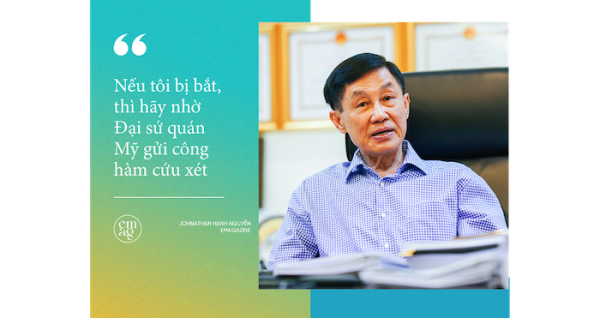
When Mr. Tran Tien Vinh heard that I had secured President Marcos' signature, he greeted me and hugged me, crying, "Hanh, today you are the hero of the country." He immediately sent a telegram back to Hanoi to report such good news to everyone. Later, Mr. Muoi Huong (Head of the Central Committee for Internal Affairs) told me that many leaders in Hanoi were waiting for "great news" from Manila that evening, and that they all exhaled a sigh of relief when the assigned mission was eventually completed.
Then, 5 days later, on September 9, 1985, the flight from Ho Chi Minh City to Manila and back to Ho Chi Minh City was launched, marking the first flight between two destinations. On the entire journey, there were 31 Vietnamese aviation officials and press reporters. The return trip carried 30 tons of goods as gifts from American expatriates sent to their relatives in Vietnam. This was Vietnam Airlines' first international flight to a non-socialist country. Prior to then, Vietnam had flights to Thailand on occasion, but each trip required authorization. Since opening a flight route to the Philippines means opening up business opportunities with capitalist countries, as well as a way for overseas Vietnamese to transport goods, gifts, and foreign currencies to their relatives in Vietnam, this event is critical to Vietnam's future opening and integration.
I still believe that my accomplishment that day was due to "natural time, ideal terrain, and human harmony." That was also the start of my 36-year journey back home to do business, which led to the formation.
03. Became the First Overseas Vietnamese Entrepreneur to Return to Vietnam in Grief With the Image of the Homeland
To Lan Huong: I assume you were having a good career abroad at the time, and Vietnam was not yet open, the economy was challenging, per capita income was low, and inflation was rising. Not only that, but there is still considerable skepticism over Viet Kieu's return to the nation. No matter what we believed, it was not the proper moment for you to return ....
Johnathan Hanh Nguyen: When I returned to Vietnam with my family for a visit in 1984, my two kids had dengue fever, but even though we had money, we could not buy medicine for them during that period. We had to go out and get towels and lemons to wipe down the kids throughout the day and night in the hopes that they would be antipyretic. We couldn't do anything better at the time, so we left it to fate. Fortunately, two of my children were able to overcome it. Many children in Vietnam, however, were still dying due to a pharmaceutical scarcity at the time.
On the flight from Ho Chi Minh City to Hanoi, the impression of Vietnam that I saw was the old, shabby and poor corrugated iron-roofed houses…
If you ask what is the motivation, the reason for me to return, then perhaps that is the reason. I want to do something worthwhile to assist the country in overcoming this difficult period, such as assisting in the procurement of additional medical...
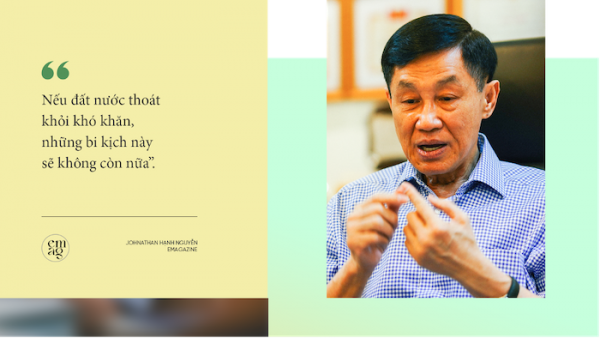
After the route was successfully opened, I completed three tasks that I regard to be my top priorities.
I began by visiting a Vietnamese refugee camp in Palawan, Philippines. "I hope you and your uncles, brothers, and sisters will send messages home advising family and loved ones to stop all intentions to cross the border illegally," I told them. I also promised to work with the governments of the United States, Vietnam, and the Philippines to reconnect their loved ones with their families through the Orderly Departure Program (ODP). Later on, the United States, the Philippines, and Vietnam all agreed, so some of our flights carry individuals to the Philippines before going to the US to reunite with their families.
Second, I asked for assistance from American lawyers to assist me in finding a legal way to bring medication into Vietnam. Finally, boxes of medications of all types were transported to Vietnam from the United States, sent by overseas Vietnamese to their relatives, and all of them were brought home by flights from the Philippines, resolving the problem of severe medicine scarcity in Vietnam at the time.
Third, we searched for ways to send remittances back to Vietnam by implementing an "on-the-spot export" policy, so that the Vietnamese government has foreign currency to use and citizens with relatives overseas have money to spend on household items and other necessities.
04. The First Lesson From Deputy Prime Minister Tran Quynh About Perseverance and Patience
To Lan Huong: When you returned to Vietnam to do business, did you encounter any challenges that made you discouraged and wanted to give up?
Johnathan Hanh Nguyen: Following the successful opening of a new flight route, Deputy Prime Minister Tran Quynh met me and grabbed my hand in his, saying, "When doing business in Vietnam, remember two crucial lessons: first, be patient and persistent, and second, comply with the provisions of the law, and the Party, Government, and People will protect you." What Uncle Tran Quynh stated makes sense to me. He was afraid I'd lose money and have to go back to America.
In the first three years, from 1985 to 1988, when Vietnam had an aviation agreement with the Philippines, I lost 5 million USD out of my total capital of 20 million USD. Back then, this was a large amount of money. I lost money since the cost for each charter flight at the time was more than 40,000 USD, and I had dozens of flights per month, but each flight just had products in and out, was empty, and had no passengers, thus the number of losses kept increasing exponentially.
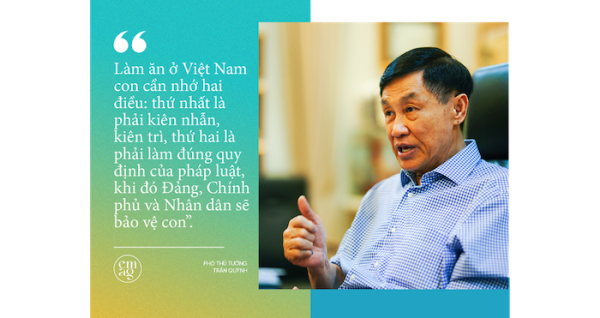
In addition, I opened a garment factory, made rattan for export, and built Vietnam's first three-star hotel in Nha Trang. I also did many different things to create more jobs for people. True, however, it was difficult to gain anything at the time, and very easy to lose.
But I always remember Uncle Tran Quynh's advice about perseverance, and I believe in my vision: the future of this nation will be bright, and prosperous. To be honest, I've made 10-, 20-, and 30-year plans for my business since then, and I think that as Vietnam's economy opens up and integrates, my potential opportunities will come, and the future will be brighter. With a loss of $5 million USD in the first three years, I consider it the money I invested to build a business foundation in Vietnam.
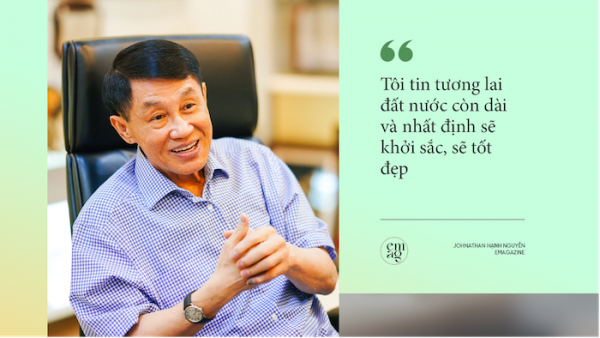
To Lan Huong: When did your business in Vietnam start to flourish?
Johnathan Hanh Nguyen: In 1988, when Vietnam and Philippines signed the Aviation Agreement and also the time when Vietnam had a Law on Foreign Investment, I no longer had a loss. After 10 years, I got my full investment and lost money in the early years back and started to make a profit.
There are some people who return home to do business with the mindset of doing short-term business, making millions of dollars, and then leaving. I, on the other hand, choose to take the long road, no matter how tough it may be; I choose to lose at times in order to build a sustainable foundation, allowing me to both further grow my profession and contribute to the country's development process. It will remain the same, whether it is now or 36 years ago.
In terms of production and business operations, I always follow the motto of equality with partners, have a long-term plan, develop the business in the direction of supporting one another, and notably have to take care of and care for individuals who are dedicated to the company. I frequently remind my employees that we must always comply with the law. In every business situation, we must first and foremost respect the law, as well as be transparent and fulfill our obligations to governmental authorities. The success of the group is measured not by its investment portfolio, but by the contribution of each business line to the country's economic progress and prosperity.
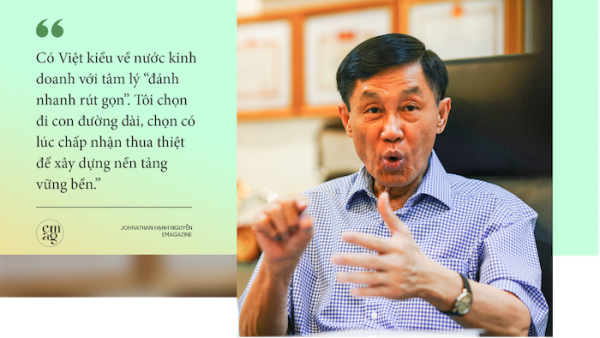
05. My "Support" is Comprised of the Party, the Government, the People, and the Respect for the Law
To Lan Huong: Many people believe that if you want to do business in Vietnam at the time, you need "support." What or who do you consider to be your "support"?
Johnathan Hanh Nguyen: I rely on the Party, the Government, and the People, as well as the fact that I have consistently upheld the principle of the rule of law over the past 36 years. There were also many who claimed at the time that I took a risk by bringing a large amount of money back to my country to do business. But in those years, legal procedures in Vietnam for those in the economic sector, such as myself, were essentially non-existent. When it comes to business licenses for companies, or, in my case, my factory, only a few documents are required. But I am confident that I have been doing beneficial things for the country, therefore I am not concerned about anyone causing me problems or difficulties.
I can gladly say that for the last 36 years, from those early days to now - when my family business (IPPG) contributed 2000 billion in taxes to the state budget for the five years preceding the epidemic - I have never done anything that is not permitted by law.
I believe that if I do something illegal, no one can save me, even if I maintain good relationships with the leaders of Vietnam. I consider this a principle of survival in business even though the profit may be less. I may have been the first person in Vietnam to start a business during the age of innovation, but I was not the richest person as a result of this decision. But, in exchange, I sleep peacefully every night and am secure in my reputation in the market as well as with ministries, agencies, and the Vietnamese government.
To Lan Huong: After doing business in Vietnam for 36 years, people know you as the "King of Luxury Goods," although it can be argued that aviation is your family's major source of profit. Numerous people believe your family has a monopoly on many "fortunate" services businesses in this industry. What are your thoughts on this?
Johnathan Hanh Nguyen: Hitherto the aviation sector has been IPPG's primary business focus. It is, however, not a surprise gift from nowhere for me, but rather a reflection of my efforts and contributions in this field.
In 1985, when the Ho Chi Minh City - Manila route was opened, Prime Minister Pham Van Dong summoned me back to Hanoi and thanked me on behalf of the Government.
There, Uncle Pham Van Dong asked me:
- Do you have any personal suggestions?
I replied:
- I have two requests that I'm hoping you'll be able to accommodate. One is for my family members in Vietnam to have passports and visas so that they can easily enter and leave the country. Second, I'd like to open duty-free airport shops.
After hearing my suggestions, Uncle Pham Van Dong immediately agrees with both of them. The very next week my family got a Vietnamese passport. As for the business of duty-free airport shops, I started doing it in 1992. To be honest, there were countless losses in the early stages because there were relatively few people at the airport in Vietnam at the time. My business was the first to invest money in duty-free shops and airport services at the time. Although there were continuous losses in the initial periods, we persisted and opted not to give up. As a person living abroad, I realize that, after opening, the number of visitors to Vietnam will increase, Vietnamese airlines and accompanying airline services will develop together.
Nowadays, IPPG duty-free and service shops can be found at all airports across the country, and many individuals have told me that we have a monopoly in this sector. However, looking back, a lack of competition in this market is due to our persistence in following the history of Vietnam's aviation industry as well as the country's economic growth path through such a long and tough journey. With that perseverance of mine, I have built a reputation in the international market. We have been assigned by large international corporations owning high-class brands to be the exclusive distribution agent in Vietnam for more than 108 brands, and the airport requires international brands to increase the level to that of major airports across the world. Therefore, it makes perfect sense for us to be the industry leader in airport retail. But, without a doubt, the airport's business is in order; no single corporation has a monopoly here.
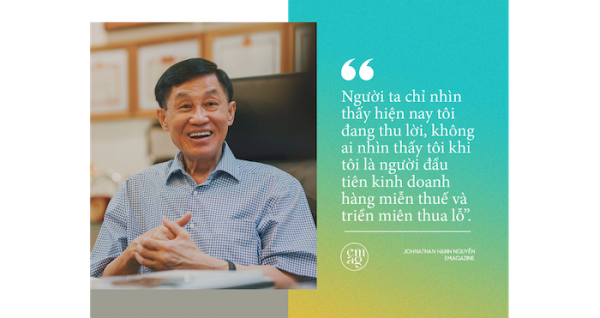
06. The Pioneer's Fourth Ten-Year Plan And Happiness Because "From Drops Of Water To Waves"
To Lan Huong: You recently said that you have created a long-term development plan for your company's 10-year, 20-year, and 30-year journey. How specific is that plan?
Johnathan Hanh Nguyen: I was well aware that I would lose my money in the first ten years. Apart from businesses and investors, there would be no large influx of visitors entering Vietnam at that time. During my second 10-year term, I focused on optimizing airport services. I began working on well-known global brands in the third 10-year period when I became a global partner with 108 brands, since I feel that now is the time for Vietnam to generate a new generation of wealthy people. Furthermore, partnering with major global brands strengthens our position in duty-free airport shops, as well as in the development of projects for high-class commercial centers (Trang Tien Plaza and REX Arcade, etc.), non-tariff zones, factory outlets (such as in Phu Quoc), and various business projects that we are working on.
To Lan Huong: Your future plans for the fourth 10-year period, which is also the current moment, will be...
Johnathan Hanh Nguyen: Vietnam's ambition is to reduce the development gap between the region and the rest of the world, with the goal of becoming a developed country by 2045. To achieve the aforementioned aim, the demand for resources for socio-economic growth over the next 25 years is enormous; while domestic resources cannot be guaranteed, the resources of foreign strategic investors are critical. The financial system of the country must function as an efficient capital conduit. I've spoken with a number of American billionaires about this topic, and we all agree that Vietnam can even fulfill its aim of becoming a developed country five years sooner. In the fourth 10-year period since returning to Vietnam, I have high expectations to take my business to the next level.
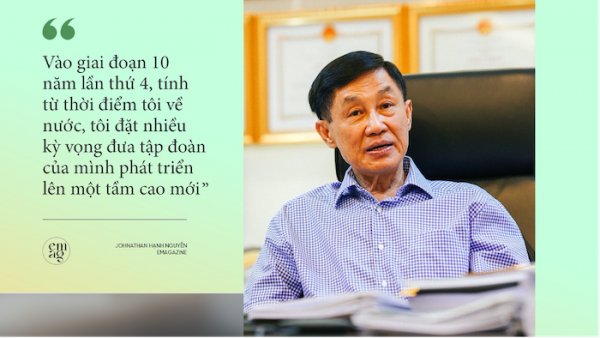
Among the 45 projects that I recently reported to the Prime Minister about investment plans, key projects of IPPG such as: Building an international financial center in Ho Chi Minh City and a regional financial center in Da Nang; Investing in non-tariff zones and smart airport cities; Establishing an IPP Air Cargo and a chain of Logistic Distribution Centers (Logistic Hubs); Building an amusement park having international brand names (Disneyland, Universal Studios, Sea World) to attract hundreds of millions of tourists… However, I cannot accomplish it alone and need to collaborate with multiple partners from the world's leading major corporations in different sectors.
The project of building a financial center is being discussed continuously by consultants with years of experience in developing international financial centers at home and abroad, and reached the consensus of investors. The project has been preliminary completed and is in the process of consulting ministries and agencies. If approved by the authorities, not just tens of billions of dollars, but hundreds of billions of dollars, will be invested in Vietnam. The only sadness is that the epidemic has delayed such plans, but despite slowing down, everything is still continuing to be supported by the authorities.
If 36 years ago, I confidently put all my efforts into participating in the process of opening up Vietnam, then this period, I confidently give all my capital and mind to developing a new path for the IPPG in particular and the prosperity of the country in general.
To Lan Huong: After 36 years, what do you think about the direction you chose when you returned to Vietnam?
Johnathan Hanh Nguyen: What I always keep in mind is: "Don't ask what the Fatherland has done for us, but ask what we have done for the Fatherland?".
I am overjoyed because, unlike other Vietnamese entrepreneurs, I have been participating in the country's renewal process from an early age. I started out as a "bead of water," but I am delighted to say that I've now evolved into a "wave" on my adventure.
Thank you for this nostalgic and emotional conversation!
Source: Dân Trí
Other news
24 - 10 - 2025 | Groups news
Johnathan Hanh Nguyen’s corporation has been recognized with two prestigious international awards19 - 08 - 2025 | Groups news
Johnathan Hanh Nguyen’s corporation has been recognized with two prestigious international awards29 - 07 - 2025 | Groups news
The CEO of IPPG signs a strategic partnership agreement with UN Women Vietnam.
